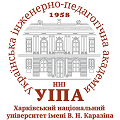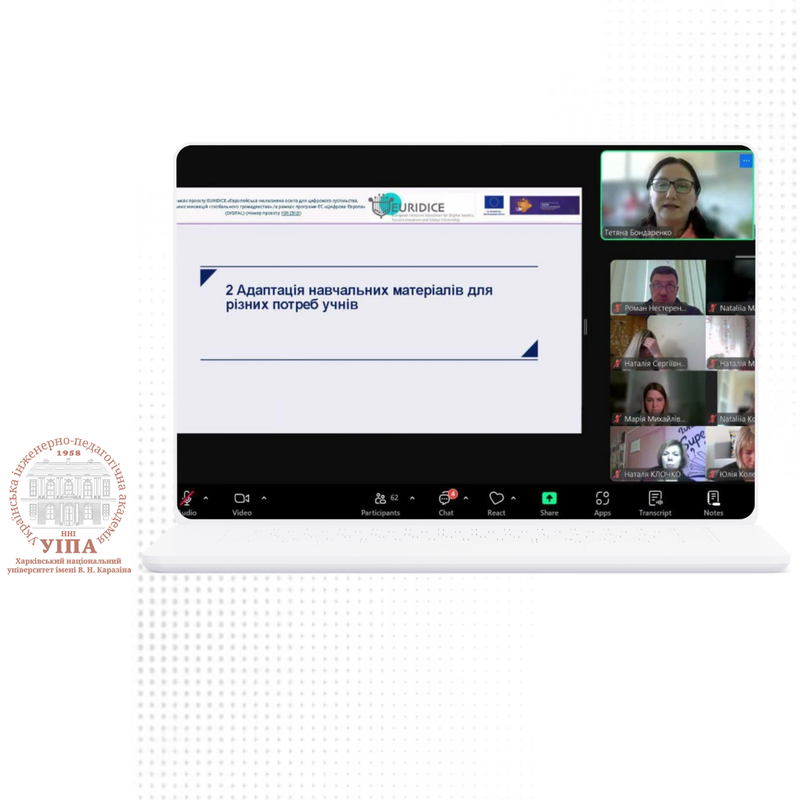Classes have begun on the advanced training course ‘Digital Technologies for Inclusive Learning’ to improve the vocational and professional skills of teachers of various categories and management personnel of educational institutions of various types, forms of ownership and subordination.
This course was developed within the activities of the Centre for Innovative Educational Technologies (CIET) of the Education and Research Institute "Ukrainian Engineering and Pedagogical Academy” of V. N. Karazin Kharkiv National University.
This course is conducted within the EURIDICE project "European Inclusive Education for Digital Society, Social Innovation and Global Citizenship” under the EU Digital Europe (DIGITAL) programme (project number: 101123121).
EURIDICE develops and implements international educational programmes on digital society, social innovation and global citizenship. The programmes are aimed at a diverse audience, from undergraduate and postgraduate students to professionals in education, communication and culture, business and industry, as well as public authorities. Societal issues are at the forefront of EURIDICE's work. Our education critically reflects on the interdisciplinary implications of the impact of digitalisation on individuals and society. Citizenship in a digital society needs to be redefined. This requires a variety of scientific perspectives: from technology and computing, to law, philosophy, ethics and culture, social sciences, humanities and communication.
Course objective: to develop students' competencies in the use of modern digital technologies to ensure equal access to quality education for children and adults with special educational needs.
During the course, students will have the opportunity to get acquainted with the following topics: Fundamentals of inclusive education, Digital technologies in inclusive education, Adaptive technologies and software, Interactive learning tools, Digital technologies for alternative and augmentative communication (AAC), Web resources and online tools for inclusive education, Safety and ethics of using digital technologies for children with SEN.
By the end of the course, students will:
- gain knowledge of the main digital resources and platforms for inclusive education; understand the use of special programmes, applications and devices (screen readers, speech recognition software, tactile displays, etc.); be able to use alternative and augmentative communication (AAC) to support the learning process (knowledge and skills);
- master the skills of developing and adapting educational materials in accordance with the needs of children with SEN; master the skills of using gamification, interactive technologies and multimedia in teaching; gain knowledge of integrating digital tools into traditional and distance teaching methods (knowledge and skills);
- have an understanding of building an inclusive learning environment using digital technologies; master the skills of organising interaction between all participants in the learning process (students, parents, colleagues, administration); master the skills of using online services for collaboration and communication (understanding and skills);
- understand the ethical use of digital resources in the work with children with SEN; understand the legal framework for inclusive education and digital learning; understand and be able to ensure the security and confidentiality of student data (understanding and ability).
Course curators: - from the EURIDICE project "European Inclusive Education for Digital Society, Social Innovation and Global Citizenship” - coordinator Olena Mykolenko, PhD, Associate Professor of V. N. Karazin Kharkiv National University; - from the Centre for Postgraduate Education of V. N. Karazin Kharkiv National University - Director Mykhailo Tatarynov.
Lectures and practical classes will be conducted by trainers: Tetiana Bondarenko, Doctor of Pedagogical Sciences, Professor of the Department of Information Computer Technologies and Mathematics, ERI “Ukrainian Engineering and Pedagogical Academy”; Maryna Vasylieva, Doctor of Pedagogical Sciences, Professor of the Department of Pedagogy, Methodology and Management of Education, Deputy Director of the ERI “Ukrainian Engineering and Pedagogical Academy”; Iryna SHTEIMILLER, Candidate of Pedagogical Sciences, Associate Professor of the Department of International Relations of the Karazin Institute of International Relations and Travel Business, Head of the Department of International Relations of V. N. Karazin Kharkiv National University; Roman Nesterenko, Deputy Head of the Department of International Relations of V. N. Karazin Kharkiv National University.
We wish you fruitful work and active cooperation.




